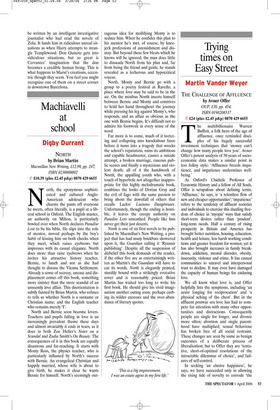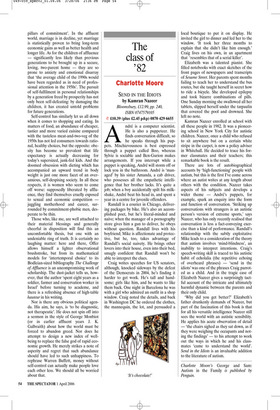Trying times on Easy Street
Martin Vander Weyer
THE CHALLENGE OF AFFLUENCE by Avner Offer OUP, £30, pp. 454, ISBN 0198208537 ✆ £24 (plus £2.45 p&p) 0870 429 6655 The multibillionaire Warren Buffett, a folk hero of the age of affluence, once reminded disciples of his hugely successful investment techniques that ‘money can’t change how many people love you’. Avner Offer’s potent analysis of 50 years of socioeconomic data makes a similar point in less folksy style: ‘Affluence breeds impatience, and impatience undermines wellbeing.’ As Oxford’s Chichele Professor of Economic History and a fellow of All Souls, Offer is scrupulous about defining terms. ‘Affluence,’ he says, is ‘a relentless flow of new and cheaper opportunities’; ‘impatience’ refers to the tendency of affluent societies and individuals to exercise this dazzling freedom of choice in ‘myopic’ ways that satisfy short-term desires rather than ‘prudent’, long-term needs. Half a century of rising prosperity in Britain and America has brought better nutrition, housing, education, health and leisure, less harsh working conditions and greater freedom for women; yet it has also brought increases in family breakdown, addiction, mental disorder, obesity, insecurity, violence and crime. It has caused communities to unravel and interpersonal trust to decline. It may even have damaged the capacity of human beings for enduring love.
We all know what love is, and Offer helpfully lists the symptoms, including ‘an acute longing for reciprocation’ and ‘a physical aching of the chest’. But in the affluent postwar era love has had to compete for attention with many other opportunities and distractions. Consequently people are single for longer, and divorce more often; abortion and single parenthood have multiplied; sexual behaviour has broken free of all social restraint. These changes are seen by some as benign outcomes of a deliberate process of liberalisation; but to Offer they are ‘tentative, short-of-optimal resolutions of the intractable dilemmas of choice’, and failures of self-control.
In seeking ‘an elusive happiness’, he says, we have succeeded only in allowing the rising tide of novelty to corrode ‘the pillars of commitment’. In the affluent world, marriage is in decline, yet marriage is statistically proven to bring long-term economic gains as well as better health and longer life. As for the children of affluence — significantly less likely than previous generations to be brought up in a secure, loving, two-parent home — they are so prone to anxiety and emotional disarray that ‘the average child of the 1990s would have been regarded as in need of professional attention in the 1950s’. The pursuit of self-fulfilment in personal relationships by a generation freed by prosperity has not only been self-defeating: by damaging the children, it has created untold problems for future generations.
Self-control has similarly let us all down when it comes to shopping and eating. In matters of food, an abundance of cheaper, tastier and more varied cuisine compared with the tasteless meat-and-two-veg of the 1950s has not led consumers towards rational, healthy choices, but the opposite: obesity has become so prevalent that life expectancy is actually decreasing for today’s supersized, junk-fed kids. And the doomed obsession with dieting which has accompanied an upward trend in body weight is just one more facet of an overanxious, self-despising society. In all these respects, it is women who seem to come off worse: supposedly liberated by affluence, they find themselves cruelly exposed to sexual and economic competition juggling motherhood and career, surrounded by commitment-phobic men, desperate to be thin.
Those who, like me, are well attached to their material blessings and generally cheerful in disposition will find this an uncomfortable thesis, but one with an undeniable ring of truth. It is certainly no laughing matter: here and there, Offer allows himself a lighter observational brushstroke, but from its mathematical models for ‘intertemporal choice’ to its Bodleian-sized bibliography The Challenge of Affluence is an uncompromising work of scholarship. The dust-jacket tells us, however, that the author ‘spent eight years as a soldier, farmer and conservation worker in Israel’ before turning to academe, and there is a refreshing absence of high-table hauteur in his writing.
Nor is there any obvious political agenda. His aim, he says, is ‘to be diagnostic, not therapeutic’. He does not spin off into a sermon in the style of George Monbiot (or in earlier affluent years J. K. Galbraith) about how the world must be forced to abandon greed. Nor does he attempt to design a new index of wellbeing to replace the false god of rapid economic growth. He merely strikes a note of asperity and regret that such abundance should have led to such unhappiness. To rephrase Warren Buffett, money without self-control can actually make people love each other less. We should all be worried about that.



























































































 Previous page
Previous page